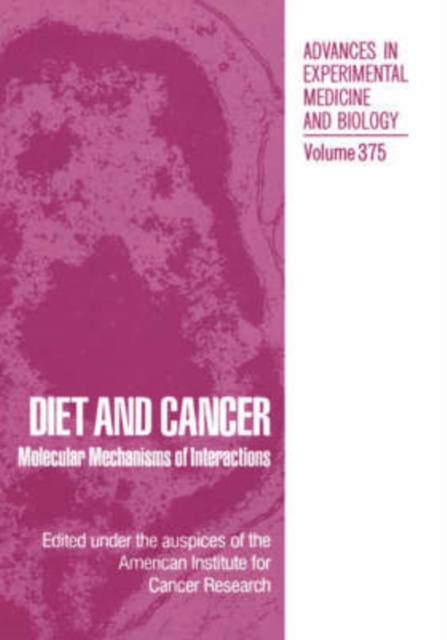
Je cadeautjes zeker op tijd in huis hebben voor de feestdagen? Kom langs in onze winkels en vind het perfecte geschenk!
- Afhalen na 1 uur in een winkel met voorraad
- Gratis thuislevering in België vanaf € 30
- Ruim aanbod met 7 miljoen producten
Je cadeautjes zeker op tijd in huis hebben voor de feestdagen? Kom langs in onze winkels en vind het perfecte geschenk!
- Afhalen na 1 uur in een winkel met voorraad
- Gratis thuislevering in België vanaf € 30
- Ruim aanbod met 7 miljoen producten
Zoeken
Diet and Cancer
Molecular Mechanisms of Interactions
€ 209,95
+ 419 punten
Omschrijving
The fifth of the annual research conferences of the American Institute for Cancer Research was held September l-2, 1994, at the L'Enfant Plaza Hotel in Washington, DC. Appropriately, in view of current directions in research, the theme was "Diet and Cancer: Molecular Mechanisms of Interactions". This proceedings volume contains chapters from the platform presentations and abstracts from the poster session held on the end of the first day. The subtopics for the tl;rree sessions held were "Retinoids, Vitamins A and Din Cancer Prevention and Therapy," "Choline and Lipids: Signal Transduction, Gene Expression and Growth Regulation," and "Dietary Factors and Regulation of Oncogenes, Growth and Differentiation. " A general overview on vitamins A and D emphasized that A and D, in addition to their established roles in vision, reproduction, and bone mineral homeostasis, may play significant roles in regulating cell function. Vitamin A metabolites, trans-retinoic acid and 9-cis-retinoic acid, regulate growth and differentiation. Furthermore, vitamin A- deprived animals were more susceptible to both spontaneous and carcinogen-induced tumors. Epidemiological studies showed a correlation between low A intake and higher incidences of certain types of human cancers. Conversely, all-trans retinoic acid is useful in treatment and control of certain types of cancer. Physiologically, Vitamin D is converted to the active form, l,25-dihydroxyvitamin D (VD). VD regulates hormone production and secretion, myocardial contractility, vascu- 3 3 3 lar tone, and growth inhibition and differentiation.
Specificaties
Betrokkenen
- Uitgeverij:
Inhoud
- Aantal bladzijden:
- 222
- Taal:
- Engels
- Reeks:
- Reeksnummer:
- nr. 354
Eigenschappen
- Productcode (EAN):
- 9780306450679
- Verschijningsdatum:
- 31/05/1995
- Uitvoering:
- Hardcover
- Formaat:
- Genaaid
- Afmetingen:
- 178 mm x 254 mm
- Gewicht:
- 635 g

Alleen bij Standaard Boekhandel
+ 419 punten op je klantenkaart van Standaard Boekhandel
Beoordelingen
We publiceren alleen reviews die voldoen aan de voorwaarden voor reviews. Bekijk onze voorwaarden voor reviews.








